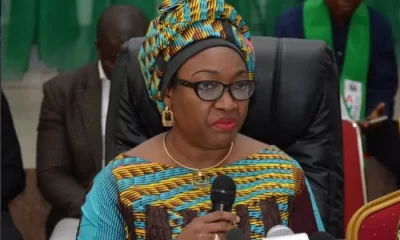Top Stories
Truss overrules Kwarteng Treasury pick in bid to calm markets
Liz Truss has overruled Kwasi Kwarteng’s top appointment at the Treasury and handed the role to a veteran Treasury official, one of a series of moves designed to calm markets and backbenchers.
It was also announced that the chancellor will set out plans to shore up the public finances three weeks earlier than planned and publish long-awaited forecasts by the Office for Budget Responsibility at the same time.
The move lay the groundwork for a change of approach as restive MPs return to Westminster on Tuesday, after a difficult Conservative conference where Truss was forced to U-turn on tax cuts for the wealthiest after mass internal opposition.
Last month’s mini-budget sent the pound crashing against the dollar and caused UK government borrowing costs to soar.
The moves came as the Institute for Fiscal Studies said on Monday that Kwarteng would need to find £60bn of savings by 2026 to fill the gap left by unfunded tax cuts and the costs of extra borrowing triggered by a panicked reaction on international money markets.
It also cited economic forecasts by investment bank Citigroup showing the UK will struggle to grow at more than 0.8% on average over the next five years. The chancellor has set a target of 2.5%.
Government sources suggested that the medium-term fiscal plan, set to be outlined on 31 October, would contain eight new supply-side reforms – and that a number would be announced in advance of the statement to ease the possibility of market shocks.
It comes as footage was unearthed by the Daily Mirror of Truss stressing the need for fiscal responsibility when she was a Treasury minister, saying to do otherwise risked a cycle of boom and bust.
Speaking to the London School of Economics in 2018, when she was chief secretary to the Treasury, Truss warned against letting “fiscal responsibility slide and allow the deficit to balloon … it leads to boom and bust”.
On Monday, James Bowler was announced as the new permanent secretary of the Treasury, having served for two decades at the Treasury and then as permanent secretary at the Department for International Trade.
But a Whitehall source confirmed that the job had been offered last week to a different candidate, Antonia Romeo, an experienced permanent secretary but someone who was seen as a reformer who did not have Treasury experience.
The announcement of Bowler’s appointment was striking in tone, with three mentions of the new permanent secretary having “20 years experience” in the department, a marked contrast to briefings before last month’s mini-budget that Kwarteng and Truss aimed to banish “Treasury orthodoxy”.
One Treasury insider said Bowler was on good terms with the prime minister. “James Bowler was the only one that she [Truss] ever got on with,” they said. “She felt the rest of the Treasury were rude to her and didn’t take her seriously enough”.
Kwarteng was widely criticised after sacking the long-serving Treasury permanent secretary Tom Scholar before last month’s mini-budget and refusing to commission forecasts from the OBR.
The mini-budget contained a number of surprise announcements, including a penny off the basic rate of income tax and the abolition of the 45p rate of tax paid by the wealthiest, a policy since discarded. Truss has since said the government should have “rolled the pitch” in advance of the statement to prevent the negative market reaction.
A No 10 source said Truss and Kwarteng had jointly made the decision to offer the job to Bowler. “The PM rates Antonia very highly, but it was felt Bowler is the best person for the job given his HMT background,” a source said.
Despite the efforts to smooth over the damage from the mini-budget, the government’s borrowing costs on the international financial markets rose on Monday to the highest levels since the turmoil unleashed by the chancellor’s ill-received tax-cutting plan.
The interest rate on 10-year government debt rose above 4.5%, returning to the level seen in the immediate aftermath of the mini-budget, when the Bank of England was forced to step in with a £65bn emergency bond-buying programme in response.
Threadneedle Street attempted to quell market jitters over the end of its support scheme, which is due to expire on Friday, by saying it stood ready to increase the value of its bond purchases for the remainder of this week.
However, investors warned the prospects for the British economy were dramatically deteriorating after the market chaos sparked by Kwarteng’s unfunded tax cuts, with a warning that higher interest rates from the Bank would offset any gains from tax giveaways. Fitch, the credit ratings agency, warned that the UK was now facing a deeper recession than previously anticipated as a consequence.
Truss is facing battles on multiple fronts as MPs return to Westminster. Her cabinet will meet on Tuesday after a conference where several senior ministers made clear they would oppose any moves to uprate benefits in line with wages, rather than inflation, a move being considered by Truss and Kwarteng that would amount to a real-terms cut.
Chloe Smith, the work and pensions secretary, who is understood to be among those sceptical of the cut, held talks at the Treasury on Monday.
The former chancellor Sajid Javid became the latest to back an inflation-linked rise on Monday morning and speaking on the morning broadcast round, Victoria Prentis, the work and pensions minister, insisted no decision had been made, while seeming to hint that she would prefer the more generous settlement.
Truss’s spokesman said on Monday the government would set out eight areas for regulation reforms, all of which have the potential to cause controversy.
One former minister said it was “difficult to navigate the waters until 31 October”. Truss has been meeting small groups of backbenchers in an effort to restore discipline in the party and will address the 1922 Committee of backbenchers on Wednesday.
One long-serving backbencher said Tory MPs were hoping the new government might be on a steadier course ahead of Kwarteng’s financial plan at the end of next month.
But another sceptical backbencher said the Treasury appointments were only the most minimal acts of reassurance. “It’s a recognition of reality, nothing more.”


 Top Stories15 hours ago
Top Stories15 hours agoMohbad’s toxicology result ready…what you need to know

 News15 hours ago
News15 hours agoFG to review fresh price hike of DStv, GOtv packages

 Top Stories15 hours ago
Top Stories15 hours agoWitness Reveals How Ex-HoS, Oyo-Ita, Others Diverted ₦3 Billion To Private Companies

 Entertainment15 hours ago
Entertainment15 hours agoIsraeli supermodel, Bar Refaeli accuses Bella Hadid of spreading fake news with photo of ‘starving Gaza child’

 News16 hours ago
News16 hours agoBlack Market Dollar (USD) To Naira (NGN) Exchange Rate Today 26th April 2024

 Top Stories1 hour ago
Top Stories1 hour agoBREAKING: TINUBU APPOINTS NIGERIA’S RENOWNED BANKER, JIM OVIA AS CHAIRMAN OF NIGERIAN EDUCATION LOAN FUND

 Sports15 hours ago
Sports15 hours agoOsimhen reveals how he was pushed to become like Drogba

 Business and Brands15 hours ago
Business and Brands15 hours agoGlo, MTN, Airtel, Others Move To Raise Tariff






